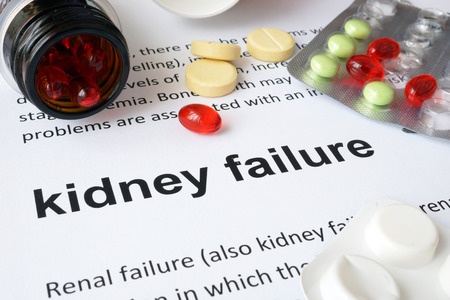Invokana Kidney Failure

Invokana, an SGLT2 inhibitor indicated to treat patients with Type 2 diabetes, has been linked to hundreds of adverse events, including dozens of cases of renal impairment and kidney failure.
Invokana Attorneys Investigating Potential Lawsuits
The nationwide law firm of Bernstein Liebhard LLP is now investigating product liability lawsuits concerning Invokana, including those involving kidney failure allegedly related to its use. If you are interested in pursuing such a case, please contact our attorneys at (888) 994-5118.
Invokana Kidney Failure Litigation
- March 2016: Two kidney damage cases involving Invokana have been filed in New Jerey federal court. One involves an Alabama resident who allegedly used Invokana for more than a year and a half before he developed kidney complications. The second case was filed on behalf of a South Carolina man who allegedly suffered a stroke and kidney damage after he was prescribed Invokana in April 2013. His complications allegedly resulted in his death in June 2013. Read More
- October 2015: An Invokana lawsuit has been filed in Canada that seeks class action status on behalf of all Canadians allegedly injured by the drug. The lead plaintiff on the complaint is an Ontario woman who claims to have suffered kidney failure due to her use of Invokana. Read More
Invokana Adverse Event Reports
Invokana was approved by the U.S. Food & Drug Administration (FDA) in March 2013, and was the first SGLT2 inhibitor cleared for sale by the agency. The drug lowers blood glucose levels in Type 2 diabetics by preventing its absorption by the kidneys. This allows glucose to be removed from the body via the urine.
Invokana’s labeling includes a number of safety warnings pertaining to the kidneys:
- The medication should not be used by patients who have severe kidney problems or who require dialysis.
- Patients should tell their doctor if they have kidney problems before starting treatment with Invokana.
- Invokana may cause serious side effects, including kidney problems.
In March 2015, the Institute for Safe Medication Practices disclosed that Invokana had been cited in 457 adverse event reports its first year on the market. Of those, more than 50 involved cases of renal impairment or kidney failure.
“The unanswered question about canagliflozin— shared in part by other diabetes medications— is whether it has clinical benefits, and whether those benefits outweigh its risks. The clinical benefits of a Type 2 diabetes drug would be a reduction in the risk of macrovascular events (e.g. reduced numbers of heart attacks and strokes), or fewer microvascular complications (e.g. a lower risk of impaired vision or kidney or peripheral nerve damage), the ISMP noted in its report. “At the time of FDA approval canagliflozin had not been tested in a sufficient number of patients for a long enough period of time to answer that question.
FDA Safety Warning for SGLT2 Inhibitors
In December 2015, the FDA ordered the manufacturers of Invokana and other SGLT2 inhibitors to add new adverse event information to the “Warnings and Precautions” section of their product labels, including information about a possible risk of serious urinary tract infections. According to the December 4th alert, the agency’s database had received 19 reports of life-threatening blood infections (urosepsis) and kidney infections (pyelonephritis) that started as urinary tract infections among SGLT2 inhibitor patients from March 2013 through October 2014. All of these patients required hospitalization, and a few required admission to an intensive care unit or dialysis in order to treat kidney failure. Read More
What is Kidney Failure?
Kidney failure occurs when the kidneys are no longer able to filter waste from the body. Signs and symptoms of this condition include:
- Episodes of decreased urine output
- Fluid retention, causing swelling in your legs, ankles or feet
- Drowsiness
- Shortness of breath
- Fatigue
- Confusion
- Nausea
- Seizures or coma in severe cases
- Chest pain or pressure
Unfortunately, kidney failure is a permanent condition that can’t be reversed. The only cure is a kidney transplant. While waiting for an organ to become available, kidney failure victims are treated with dialysis to remove waste from the body.
Learn More about Filing an Invokana Lawsuit
Bernstein Liebhard LLP is offering free, no-obligation legal reviews to individuals who may have suffered kidney failure or other complications related to the use of Invokana. To learn more about filing an Invokana lawsuit, please call (888) 994-5118.
- FDA (2013) “FDA approves Invokana to treat Type 2 diabetes.) http://www.fda.gov/NewsEvents/Newsroom/PressAnnouncements/ucm345848.htm
- Janssen Pharmaceuticals, Inc. (2013) “Medication Guide: Invokana” http://www.fda.gov/downloads/Drugs/DrugSafety/UCM346637.pdf
- ISMP (2015) “QuarterWatch Report” http://www.ismp.org/QuarterWatch/pdfs/2014Q2.pdf
- FDA (2015) “FDA Drug Safety Communication: FDA warns that SGLT2 inhibitors for diabetes may result in a serious condition of too much acid in the blood.” http://www.fda.gov/Drugs/DrugSafety/ucm446845.htm
- MayoClinic (2015) “Acute Kidney Failure” http://www.mayoclinic.org/diseases-conditions/kidney-failure/basics/symptoms/con-20024029
Get the latest news and litigation updates about this case by following us on Facebook. Click the "Like" button below.
Follow Us


